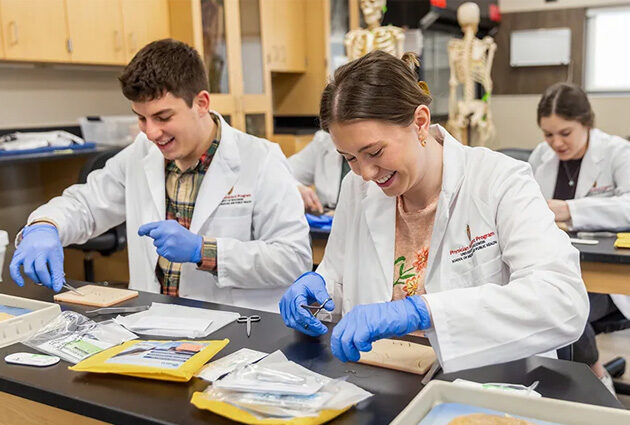
PA Program Options
Whether you’re leaning towards caring for patients in underserved areas, are drawn to the public health field, want to train in Madison or need flexibility to complete your degree, we encourage you to explore the program’s range of options.
Your needs and interests will help you determine which of our PA program options is right for you. We offer full-time options on three different campuses, as well as part-time and MPH-MPAS dual degree options.
Before You Apply
You may apply for two options; our admissions committee will decide on the best fit. For any program option, we are looking for candidates who meet our mission.
Full-Time Campus Option
We offer full-time, 24-month professional program options on three campuses: UW–Madison, UW-Platteville and UW-Stevens Point at Wausau. All three of the campus options result in a degree from UW–Madison. All full-time campus options include one year of didactic training (lectures, labs and discussions) and one year of clinical rotation consisting of four core two-month rotations in emergency medicine, family medicine, internal medicine and surgery, and one two-month rotation in a student-elected area of medicine. Most lectures originate from the Madison campus.
UW–Madison
Our UW–Madison campus offers a vibrant community in the heart of our state’s capital city. Learning takes place in the state-of-the-art Health Sciences Learning Center at the UW School of Medicine and Public Health, where you will have access to the Clinical Teaching and Assessment Center, a simulated clinical environment designed to look, feel and function like a real-world setting. Clinical rotations may take place in Madison or at locations around the state.
Who should apply: Students who enjoy campus life and a bustling metropolitan area. Madison students are committed to the delivery of comprehensive health care in a culturally and ethnically sensitive manner and interested in primary health care for populations and regions in need.
UW-Stevens Point at Wausau
Known as wisPACT@UW-StevensPoint at Wausau, this program option features clinical rotations in or around northern Wisconsin. For the first summer (10 weeks), you will need to be in Madison. Labs in this campus program will be conducted by UW–Madison PA program faculty at UW-Stevens Point at Wausau.
Who should apply: Students with a strong connection to northern Wisconsin who want to practice in this region. Students are only required to be on campus two days per week, which some find easier to balance with work or home commitments.
UW-Platteville
Our wisPACT@UW-Platteville program option, brand-new in 2023, targets the tri-state region (Wisconsin, Illinois and Iowa). Most clinical rotations are completed in this region, and 50% of rotations take place in a rural community. There is no requirement to be in Madison for any portion of this program. UW-Platteville is committed to becoming a healthcare hub, and surrounding organizations are eager to partner for clinical rotations.
Who should apply: Students interested in a lively campus who can commit to being there five days a week and have a strong affinity for practicing in the tri-state area. If you are currently a UW-Platteville undergraduate, you may also apply for the 3+2 program option, which would allow you to graduate with both a bachelor of science in biology from UW-Platteville and a master’s in physician assistant studies from UW–Madison in 5 years (3+2).
Full-Time Degree Plan
Year One
Year Two
Meeting Care Needs of Rural Communities
Students completing PA degrees through the full-time campus options at UW-Platteville and UW-Stevens Point at Wausau are helping address a critical shortage of primary care providers in rural Wisconsin.
More about rural care training
Part-Time Distance Option
We offer a part-time, 36-month distance option featuring 24 months half-time didactic instruction and 12 months full-time clinical training. Video-captured lectures, with asynchronous discussions, provide a flexible learning environment. The majority of learning is completed in and around the student’s home community. During clinical rotations, every effort will be made to keep students in or as close to their home community as possible. However, final decisions for placement will be based on availability of qualified preceptors.
Who should apply: If you have a strong connection to your community, a desire to practice there after graduation and would like flexibility as you pursue your degree, the part-time option may be for you. How to know which one depends on how far away you live. The regional distance education (rDE) option requires that students commute to Madison every day in the first summer (12 weeks) and up to several times per week, on a regular basis, during the two years of their didactic education. The traditional distance education (tDE) option requires that students be in Madison for the first summer of the program (12 weeks) and twice per semester thereafter for labs at the Health Sciences Learning Center. If you live in a medically underserved community and are further away from Madison than a couple hours’ drive, you may want to consider the tDE option.
Note: Due to federal regulations, we are unable to accept applications for our part-time distance option from those living in California.
Part-Time Degree Plan
Year One
Year Two
Year Three
MPAS-MPH Dual Degree Option
With this full-time, 33-month, on-campus dual-degree option, you may earn a Master of Physician Assistant Studies and Master of Public Health (MPAS-MPH) degree, consisting of two semesters of MPH curriculum, one full year of PA didactic curriculum and one year of PA clinical rotations.
Who should apply: Students who have a strong desire to integrate public health into their PA practice after graduation.